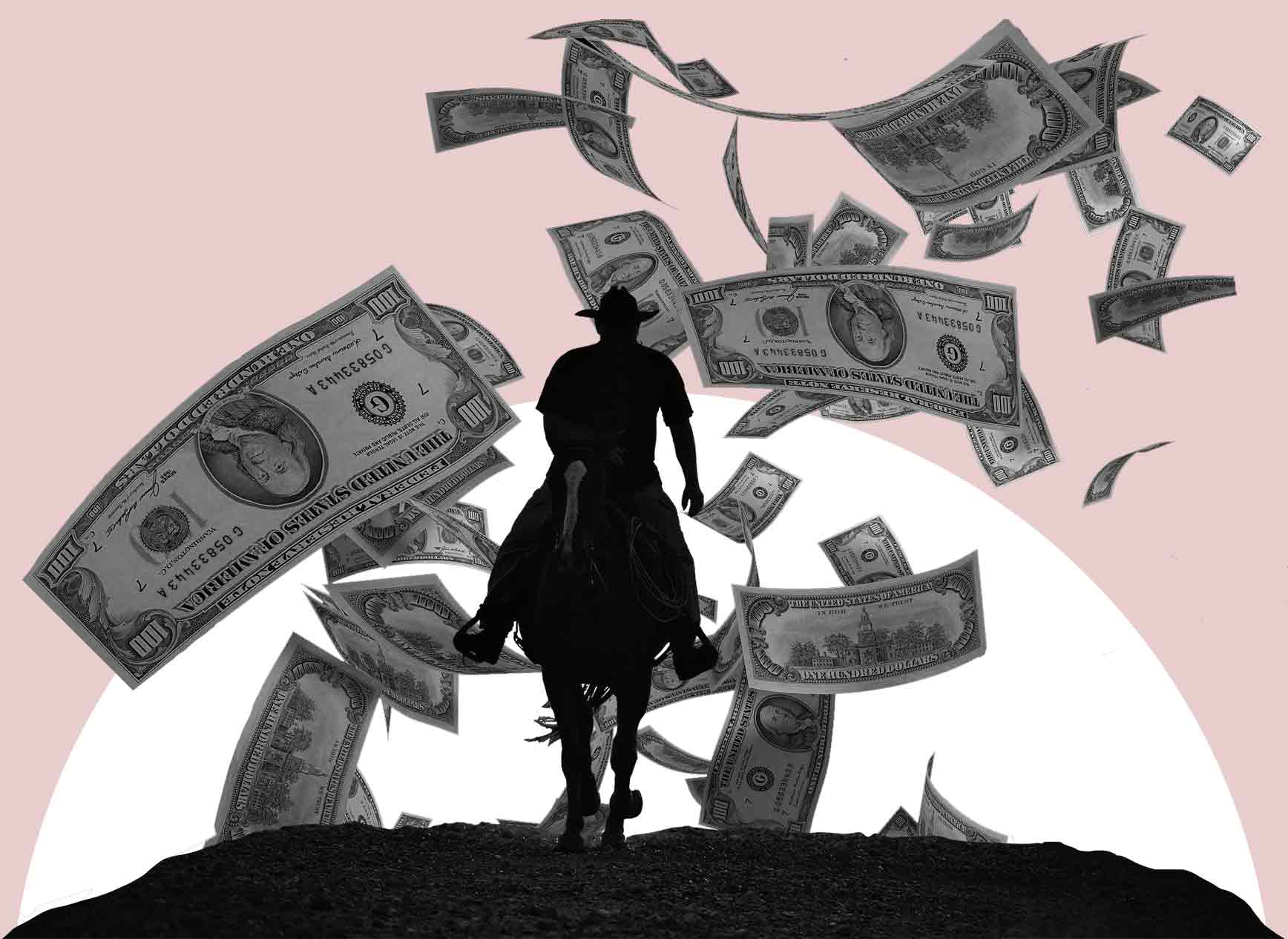Story • €150 BN • Cooperation • Faq
CumEx-Files 2.0

CumEx Files 2.0 – The outrageous tax fraud goes on

He got rich with our money. Now he lives in Dubai. Some say he’s hiding.
The man who allegedly robbed more than a billion euros from the tax coffers of several countries now sits at a restaurant overlooking a lush green golf course. Outside, the heat pushes through the desert. Further back, the Dubai skyline rises.
Investment banker Sanjay Shah is here to tell his side of the story. Prosecutors in at least three countries, including Germany, are investigating him for so-called cum-ex deals. In Denmark alone, the amount in question is in the seven-figure range. But Shah says he’s not to blame: “If there’s a big sign on the street saying, ‘please help yourself’, then me or somebody else would go and help themselves”. Undeterred, he repeats, everything he did was legal.
Of course, the presumption of innocence also applies to Shah. But things are about to get tight for the banker. The German Federal Court of Justice has already dealt with the types of trades he considers legal, and their past rulings have been consistent: tax evasion. Cum-ex deals are generally illegal. Criminal.
Shah has long been among the winners of a huge, and likely fraudulent, game in which a network of banks, consultants and investors used tricks, shorting and sophisticated trading patterns to scam billions from public funds. With few exceptions, many countries effectively let them operate with impunity.
The fraudsters operate in a fast-paced, globalized market with highly complex rules. At the same time, there are overburdened authorities, cumbersome procedures, rigid structures and a patchwork of administrative responsibilities.
In 2018, when many believed cum-ex trading was primarily a German problem, a team of 38 journalists led by CORRECTIV revealed that the scammers were doing business throughout Europe. With the help of experts, we calculated that €55.2 billion were lost to tax-driven deals like cum-ex trades. But even then, we suspected that this was not the full extent of the fraud.
Three years after the first CumEx Files, CORRECTIV has once again brought together a group of 30 journalists — this time from five continents. Now, the evidence is undeniable: the cum-ex system is global. No country is safe.
Our newest research sheds light on the true dimensions of cum-ex fraud. It is likely that at least €150 billion were robbed from taxpayers worldwide, according to calculations by a team of tax experts at the University of Mannheim. That’s almost as much money as the EU spends in a year. “The damage could be even higher,” said Christoph Spengel, an economics professor at the University of Mannheim who helped analyze global trading data with his team.
Total Revenue Loss
(in billion euros, 2000–2020)
Spengel also saw something else troubling in the data: In Germany, the fraud appears to have continued through cum-cum deals, a special form of tax-driven trades. “Cum-cum deals were merely made more difficult,” Spengel said. “They are still possible.”
Even though a law passed in 2016 was supposed to prevent exactly that. Even though politicians continue to affirm that those types of scams are no longer possible.
When asked about this, a spokesperson for the German Federal Ministry of Finance (BMF) said that the agency had found no evidence of specific cum-cum transactions after 2016 and therefore could not confirm Spengel’s calculations. They also said that officials at BMF are in regular contact with the federal states about cum-ex and cum-cum transactions.
Olaf Scholz, Social Democratic Party leader and front-runner to replace Angela Merkel, leads the BMF. And it seems his Ministry of Finance is not the only agency failing in the fight against tax-driven deals. Documents from the European Securities and Markets Authority — the EU’s financial market regulator — give a glimpse of how European authorities are dealing behind the scenes with the issue of cum-ex trades and other tax-driven deals.
The picture is still devastating three years after our initial cum-ex investigation. European states are failing to combat systematic tax fraud.
EU states lack the awareness that they can only solve the problem together. Regulators deflect responsibility and claim not to be competent. But even if they wanted to cooperate, laws often prevent authorities from sharing important information across agencies and borders.
Things are better on the other side of the Atlantic: The U.S. successfully stopped cum-ex deals a few years ago.
Meanwhile, sitting in a restaurant in the Dubai desert, Shah is candid about wanting to get business up and running again: “If I had the ability to run a business, I would immediately get involved in this business again.”
The Cum-Ex Banker Sanjay Shah

Like all good salesmen, Sanjay Shah is usually chatty. But just before our conversation, he seems cautious.
The camera is ready. But Shah does not want to start until his lawyer is there. He’s stuck in traffic.
Shah is said to have been one of the most ruthless traders involved in the global cum-ex scheme. His deals: trimmed for maximum return. His parties: legendary. Luxury yachts, Formula 1 weekends, private concerts with Prince, Elton John and Ed Sheeran. That is why a team from CORRECTIV and ARD’s show Panorama has travelled to Dubai.
Even if Shah sees it differently, he was probably involved in the biggest tax heist of all time. An entire industry used complicated transactions to get tax offices to refund a tax paid once several times. In other words, these deals are not just about avoiding taxes — actors like Shah took money from the public coffers that they never paid to begin with.
This type of deal is known as a cum-ex deal. In the related cum-cum transactions, shares are exchanged in such a way that only part of the tax due is paid. They are also called tax-driven transactions, because the returns come from the state. It is taxpayer money.
The deals are, in a way, the perfect crime. Complicated, abstract, far removed from our everyday lives. At first glance there are no victims. No one seems to be directly affected when the state has less money.
But the truth is that we are all affected. Because the billions that bankers, investors and financial institutions have robbed from the state are taken from budgets somewhere else: from schools, from hospitals, from fire departments.
It is money that is owed to us all.
How does Cum-Ex work?
Simply explained: The state pays back multiple times a tax that was never paid or only paid once. In this way, the players make a profit and society loses billions in tax money to which it is entitled.
You can think of it like a scam for child benefits. Imagine a German couple has no children, but their friend from London is visiting with their kid. Although the child does not really live with them, the couple registers the friend’s child with the authorities as their own. When the British friend visits another acquaintance, that person also registers the child as their own. They go on to visit three, maybe four more friends in Germany — each of whom registers the child as their own.
When the British friend and their child return to the UK, the child is registered once again with its actual parent. But the German government does not know this, and pays child benefits to each of the German families who participated in the scheme. The stolen child benefits are then split among all the families taking part in the scam.
In the case of cum-ex fraud, stock shares are strategically traded between multiple entities so that on paper, it seems like they are all owners. And instead of child benefits, millions of taxpayer euros are paid fraudulently to each party claiming reimbursements.
The bankers take advantage of the fact that tax offices did not detect the fraud. But in the end, the money they scam is missing from other places. For the renovation of a kindergarten, for example.
Cum-ex fraud is a story of inequality. Bankers, brokers and immensely wealthy investors — people with power, money and privilege — are dipping into the tax funds that we all pay into.
In Germany, the state has lost more than €7 billion to cum-ex trades and around an additional €28.5 billion to cum-cum deals — roughly €36 billion in total. For comparison: That’s nearly double what the German government spent on 20 years of war in Afghanistan.
Banks both large and small are involved in the scandal, including Deutsche Bank, HypoVereinsbank, Commerzbank and the Hamburg-based private bank M.M. Warburg and Co. The affair reaches into the highest political circles. In 2016 and 2017, Scholz — then mayor of Hamburg — met with the head of Warburg about cum-ex. The bank now has to pay back to the state €176 million it accrued through cum-ex transactions. Scholz denies that he exerted any political influence on behalf of the bank. He said that could not remember anything else about the meetings.
But investment bankers like Shah are not that interested in individual countries. Why only focus on Germany when there is money to be made in Spain and France, in Japan and Australia — even in South Africa? The market is global, after all.
The losses total at least €150 billion worldwide. We calculated this sum with the help of Spengel and his team. “There are unbelievable billions of dollars in tax losses, this type of tax-driven business must finally be stopped,” said Spengel, who has been researching tax-driven trading for years.
The taxpayer money is now in the accounts of bankers, traders and investors. At one point, Shah owned 25 properties in London. He lives in a luxury villa in Dubai on the artificial palm island of Jumeirah, less than 10 kilometres away from the bar and restaurant where he now stands, waiting for his lawyer.


This is where he organises his defence. He is under investigation in Denmark, Belgium and Germany. He may soon have to return his assets. He may even be sentenced to prison. But the tighter things get for Shah, the more publicity he seeks. He takes the bull by its horns.
Shah’s lawyer walks through the door in a chic suit and Prada sport shoes. In contrast, Shah looks down to earth wearing jeans, trainers and a t-shirt. The banker sits down in the spotlight, pulls his shirt into place and is ready to go.
The prosecutor who chases Cum-Ex Fraudsters

Some 5,000 kilometres away, public prosecutor Anne Brorhilker sits in her Cologne office. She can only smile when reporters from ARD’s Panorama mention Sanjay Shah. She is aware of him, he is on her list of people under investigation. “He is certainly someone who was quite risky,” she says. His deals stood out, which is why he was quickly discovered.
Around eight years ago, a complex financial crime case landed on Brorhilker’s desk. Since then, the hunt for cum-ex fraudsters has become her life’s work. She is a senior public prosecutor with her own large department. Almost 100 people work for her. Brorhilker’s job is to identify the perpetrators and recover the state’s money. Over the years, she has immersed herself in the issue like almost no one else in Germany.
Brorhilker is friendly, with a dry sense of humour. “I usually find it very funny when someone tries to shout at me,” she says. So you can imagine how the machismo of furious bankers and lawyers roll off her back.
Spotlight Newsletter
The best investigative journalism – delivered straight to your inbox. Subscribe now to our Spotlight International Newsletter
She wonders why men like Shah are so desperate to cling onto the idea that their business was legal. “I can only explain it as a defence mechanism to try to maintain, for as long as possible, a version of themselves and their environment that they can live with,” she says. These men were used to being admired, she explains, and now they are supposed to be criminals? It can be a hard adjustment.
It was perfectly clear that the cum-ex transactions were illegal. Tax fraud. Full stop. This was confirmed by the Federal Supreme Court last summer. The judge said it was a blatant grab at tax coffers.
Now with more staff, more responsibility and finally a clear ruling from the Federal Court of Justice, 2021 has been a good year for Brorhilker and her team.
An ex-banker from Warburg, prosecuted by Brorhilker, was convicted in the summer. He was sentenced to five and a half years in prison for his role in cum-ex trading. A year earlier, two British traders were handed suspended sentences. Both of them, who she continues to work with, provided Brorhilker with information about deals and business partners.
Cum-Fake, a third variant of tax driven trades

Brorhilker talks to witnesses and defendants. She analyses stock exchange data and searches banks. And what she finds worries her.
“We have an initial suspicion that there are new models,” she says. The spikes in transactions around a share’s dividend record date — the key date for this type of deal — are very similar to those seen in the heyday of the cum-ex deals. There are also statements from witnesses and expert opinions from law firms that support her suspicion.
Now you might be wondering: After all that, people can still profit from taxpayer money in Germany?
Cum-ex transactions were supposedly made impossible in Germany at the start of 2012, and the related cum-cum transactions in 2016. In 2018, two CORRECTIV reporters went undercover as rich corporate heirs to meet an agent who had learnt from Sanjay Shah. They were given a quote on tax-driven investments in a London hotel sweet. The agent came prepared with a presentation that mentioned France, Italy, Spain, Norway, Finland, Poland and the Czech Republic. There were profits to be made all over the world. But at the moment, Germany was too hot.
Brorhilker and her team also have a hunch about what kind of deals might be going well right now. Witnesses have mentioned it and in the US, fines have already been imposed for this newest type of tax-driven trade.
The name: cum-fake. It is the third variant after cum-ex and cum-cum.
The transactions relate to a peculiarity of the US stock exchange. In order to trade foreign shares in the States, you need a substitute security known as an American Depositary Receipt (ADR).
The instrument was created almost 100 years ago to save time and money by cutting down on annoying conversions and avoiding delays resulting from time differences. Technically, every US security has to be backed by a foreign share. However, to speed things up, pre-release ADRs can be issued even before the corresponding share has been deposited.
The share has to be filed soon afterwards. But not all traders take the requirement seriously. As a result, they are able to create the false impression that they own foreign shares. And since the shares do not actually exist, the transactions are called “cum-fake” deals.
Why would bankers want to trade such a product in the first place? To get tax refunds abroad that they are not actually entitled to. At least that’s how the US Securities and Exchange Commission (SEC) sees it. Since 2017, they have imposed fines totalling almost $432 million on 15 banks for being too free with US ADRs, including Merrill Lynch, JP Morgan, Société Générale, Citibank and Deutsche Bank. The banks paid the fines, but did not admit any wrongdoing.
Shah may have also been interested in cum-fake deals. A few years ago, he and his business partner at the time, Larry Meyers, wanted to open an office in New York. The SEC identified conspicuous trades in purported Portuguese and French stocks. In 2019, Meyers admitted that he had carried out illegal trades with pre-release ADRs.
But nothing came of the office, Shah claims. “I didn’t get involved because I just didn’t have the capacity to. But if I had the opportunity I would have explored it.”
Insiders, investigators and experts all agree: The trades can be carried out with practically any stock in the world — including German ones. Which means you could get a tax refund in Germany.
Has this happened?
After the CumEx Files were published in 2018, the European Securities and Markets Authority (ESMA) asked the financial regulators in each EU country what they knew about tax-driven transactions.
In a 2019 letter to the ESMA, officials at the German regulator BaFin said it’s unlikely that any cum-fake transactions took place: “Based on the information currently available, the German revenue administration does not believe that multiple tax refunds happened in these cases.”
But one year later, a different German authority sounded the alarm. The Federal Audit Office, which monitors the German state budget, issued a press release in October 2020 titled “Cum-fake transactions: closing the loophole for tax fraud”. In the accompanying 23-page report, the authority describes why cum-fake deals are still possible in Germany.
So was BaFin asleep?
In response to a request from CORRECTIV, the agency’s press officer said that they were already aware of cum-fake fraud in 2018 — but deflected BaFin’s responsibility for prosecuting the individuals making the deals.
“In November and December 2018, discussions took place with investigative authorities regarding the relevance of the findings made by the US Securities and Exchange Commission on ADR transactions with regard to capital gains tax refunds by German tax authorities,” she wrote.
Then she continues: “BaFin has neither a statutory task nor the authority to prosecute tax crimes… Regarding legislative decisions, I may refer you to the responsible ministries.”
In response to an inquiry from CORRECTIV and ARD’s Panorama, a spokesperson for the BMF said that the federal states had not presented the agency with any evidence of tax-driven trades with ADRs after 2016. Investigations by the public prosecutor’s office and the Federal Central Tax Office have not yet been completed for cum-fake cases prior to 2016, they added. That being said, the BMF already estimates the total tax risk to be in the low to mid double-digit million range.
Back in Brorhilker’s Cologne office, we ask whether the losses caused by cum-fake transactions in Europe could be as high as those caused by cum-ex transactions.
“Yes, I can well imagine they are,” she says.
That would mean billions.
The Federal Audit Office has already appealed to lawmakers to put an end to the loophole that allows cum-fake transactions, she warns. Spengel is also convinced that tax-driven deals can continue to be made in Germany — and not just cum-fake deals.
“Everything is still possible in Germany,” he says. “I don’t think so, that’s the way it is.”
Cum-Ex banker Shah allegedly needs nothing more than a printer

If Shah’s parents had had their way, their son would have become a doctor, just like his father. Shah even studied biomedicine for a few semesters. “But I didn’t have the motivation for it,” he says. Several years at university followed by a long apprenticeship at a hospital did not appeal to Shah. He just wanted to make money.
So he joined the consulting firm KPMG, before learning about trading, derivatives, futures, options and forwards at Merrill Lynch. At Credit Suisse, Shah finally met his mentor: Paul Mora, a New Zealander notorious for his role as one of the key figures behind cum-ex deals. Today he is wanted on an international arrest warrant.
At the time, though, he was simply Shah’s boss. “For about a year, it was just Paul and me,” Shah says.
When the financial crisis hit in 2008, Shah was working for Rabobank. He was dismissed from his job and decided to start his own business, called Solo Capital LLP. In Dubai, Shah tells us what he was thinking at the time: You don’t want me? Then I’ll just do it alone — solo!
Shah’s storytelling is consistent with a handwritten CV that is part of the CumEx Files. He tells his story as the rise of a humble man who does everything for his family. A man who set up a foundation for autism research and organises charity events with rock stars because his son is autistic. This is the image he wants to give the outside world through his own communication channels: YouTube interviews and videos of his dogs on Instagram. Shah, the family man.
But there is another version. The story his partners and associates tell. In this version, Shah emerges as a ruthless and extravagant swindler.
A cowboy. A crazy dog. That is how Benjamin Frey, a colleague of Shah, describes him. Frey, who requested that his name be changed for this story, was part of the inner circle of cum-ex tax lawyer Hanno Berger, who is allegedly one of the key figures and intellectual fathers of the cum-ex scandal. Frey also testified to public prosecutor Brorhilker. In 2018, he agreed to an interview for the CumEx Files — wearing an elaborate mask so no one would recognise him. His boss at the time, Berger, is currently in custody in Switzerland and is fighting extradition to Germany.
Almost all stockbrokers involved knew there were limits, says Frey. But not Shah. He was so over the top, Frey says, that not even his boss Berger wanted to do business with him. He remembers the words of a fellow trader: “Shah is going to be the death of us all.”
Leak to us
One of the British bankers who received a suspended sentence for cum-ex fraud in Germany also remembers a self-indulgent braggart. “Shah was a man with something to prove,” says Martin S.
Shah wanted to make a name for himself. Hence the risky deals. Hence the wild parties, Formula 1 weekends and private concerts with rockstars.
“My parties were legendary,” says Shah with some pride. They were expensive, but there was a reason for that. “It wasn’t just to have a good time, it was actually to develop loyalty.” After all, satisfied customers mean satisfied partners.
And money.
Normally, a high level of coordination among many partners is required for cum-ex deals to come to fruition. Banks provide the lubricant for the machine: credits worth millions or billions. They issue the certificates that allow for tax refunds.
But Shah preferred to do everything himself. He found a way to not just be a cog in the machine, but to control the whole system: He bought a bank. The Varengold Bank in Hamburg, where he allegedly organized his own cum-ex deals.
“If you can control everything yourself, if you don’t need partners anymore,” says Frey, “You don’t have to share the spoils, either.”
In cum-ex circles, people whispered to one another: Shah only has one printer. That’s all he needs.
Shah took the system to the extreme. He rotated the same shares up to 20 times — and collected the tax returns every time. It’s a strategy known as looping, and even for cum-ex traders, it’s pretty unscrupulous.
Now, little by little, this is all rebounding on Shah. The Danes are looking for him most pressingly because that’s where he caused the most damage: Over €1 billion lost to Shah alone. The Danish tax authorities filed a claim against him in the United Kingdom — unsuccessfully — to try to get their money back. There are also proceedings against him in Belgium. Recently, the Hamburg public prosecutor also charged him with money laundering for allegedly using Varengold Bank for cum-ex trading.
Shah says he still has a lot of money: more than half a billion euros. But it is of little use to him at the moment. The authorities have frozen his assets. He can only maintain his house and pay his lawyers. Shah estimates that he has spent $50 million on these things alone.
Even when Shah’s cum-ex house of cards is tumbling down, he maintains that he is not to be blamed. In Shah’s world, there is a skewed relationship with the law. On one hand, it is the highest standard. Traders and banks go through countless expensive appraisals to prove that their deals are legal. On the other hand, they don’t care about a rather simple truth: You cannot have taxes refunded more than once.
Authorities are slow in responding to Cum-Ex tax fraud

When Shah is asked if he can understand why taxpayers are angry about cum-ex deals, he shifts the responsibility away from himself. He prefers to ask a counter-question: “Why don’t you ask your government why they didn’t close the loophole?”
It seems as if Shah wants to divert attention from himself. And yet, he is right about one thing: Authorities across Europe have known since at least 2018, when the CumEx Files were published, that their coffers could be raided. You might think that they would have been on alert since then, checking their systems, questioning bankers, talking to politicians and prosecutors.
But on the contrary, they have done little to stop the fraud. Authorities in Europe are still failing to act in the fight against systematic tax fraud.
Slow, incomplete, unwilling: This is the response of public administrators to these organized raids, according to dozens of public and internal documents obtained by CORRECTIV, including responses to the 2019 ESMA inquiry into EU financial regulators and a subsequent inquiry from the European Banking Authority (EBA) to banking regulators.
Every country in the European Union has regulatory authorities that monitor the financial markets on a day-to-day basis. For example, they look for illegal trades or possible cases of money laundering. To do this, they can request reports from banks, analyse transaction data and talk to bankers and traders. They can also impose heavy fines — as the US regulator did in response to cum-fake deals.
Every country also has an office that collects taxes, checks receipts and refunds other taxes. If someone defrauds the tax office, public prosecutors might start an investigation for tax evasion, like Brorhilker did.
The most obvious problem that emerges from the responses to inquiries is the lack of understanding in how to address tax-driven transactions like cum-ex deals. If it were tax evasion as ruled by the German Federal Court of Justice, then tax offices and public prosecutors should be the competent authorities.
But there is another problem. The tax offices of EU member states hardly cooperate with one another. They are often not even allowed to do so, as tax secrecy laws prohibit it. But for individual tax offices, it can be difficult to get a full understanding of the deals.
In order for financial regulators to address cum-ex deals, the trades have to be categorized as market abuse. For example, different players would have to collude, similar to how a cartel might fix prices. If you believe the investigations by Brorhilker and testimonies of insiders, cum-ex trades can only be possible if different players coordinate with one another. If everyone has a clear role.
However, the EU authorities who sent out the questionnaires came to a different conclusion. It was a tax matter, they wrote, and thus the national supervisory authorities declared themselves not responsible. A report from ESMA shows that they came to the same conclusion.
How can the authorities be shirking their responsibilities?
Attorney Alexander Heist has been dealing with cum-ex and other tax-driven deals for years. “I think the view [of ESMA] is grossly wrong,” he said. It is precisely the EU financial regulator that should be responsible because it is, among other things, about market abuse, he said.
The EU authority, however, does not share this view and insists that only national supervisors are responsible: “ESMA has no supervisory powers in relation to market abuse, so it will be for the competent national authorities to assess whether any scheme is market abuse,” a spokesperson wrote to CORRECTIV.
But it can also be difficult for national supervisors to convict fraudsters. The statement explains that while cum-ex deals could involve market abuse, that’s not usually the case: “Perpetrators tend to avoid manipulative behavior not to be detected.” In other words, they are smart enough to trick the system.
What the EU regulator reports only mention in passing is that there are some national authorities who see themselves as responsible and are investigating tax-driven deals: Luxembourg, the Netherlands, and the UK, for example. The British regulator even seems to have found an effective tool for identifying potential tax-driven deals, according to their response to the ESMA survey: A system that alerts officials to suspicious transactions around the dividend record date.
However, the ESMA report notes that British regulators have more powers than their EU counterparts. That is true. Still, it would be possible for the European regulator to promote the tool and for other governments to give their own supervisory bodies more power to stop the fraud. ESMA could vouch for the latter.
They send a simple message: This is not our responsibility.
When asked about this, their spokesperson wrote: “The UK Financial Conduct Authority experience was indeed taken into account and shared with the national competent authorities as part of ESMA’s governance.” That’s all. Have they considered introducing a system similar to the UK’s at the European level? No answer.
Sven Giegold, financial spokesman for the Greens–European Free Alliance in the European Parliament, said that he sees the problem in governing structures. “All member states are represented on ESMA’s Board of Supervisors and have no interest in inconvenient investigations into the work of their own supervisors.” Member states have so far lacked the political will to set aside their influence in favor of Europe’s interests, he wrote in an email to CORRECTIV.
BaFin in Germany also appears to have analysed transaction data in order to track down potential tax-driven trades, like in the UK. Only the result is very different. According to their response to the EU inquiry, the data is not suitable for finding cum-cum and cum-fake trades, only cum-ex.
How can the UK regulator see something in transaction data that BaFin does not?
Alexander Heist, a criminal tax lawyer, cannot explain BaFin’s findings. He and other experts believe the data is sufficient to identify all potential cum-deals. “I think the analysis of market data is possible and purposeful.”
And then there’s the lack of communication between agencies. In some cases, the authorities don’t even cooperate with each other within their respective countries. Tax offices don’t talk with financial market authorities. The public prosecutor’s office works alone. Yet it would be so much easier to detect tax-driven deals if information could be shared, or the market regulator could warn the tax office: Don’t refund the tax, it’s a cum-ex trade!
This problem is particularly evident in Austria. By law, their market regulators are not allowed to discuss open tax procedures with the tax officials.
However, there are other authorities that could take accountability for cum-ex trades. Consider anti-money laundering authorities. If cum-ex trades are criminal, then bankers and investors are laundering money when they invest the profits from the illegal transactions. Shah has been charged in Germany on precisely these grounds: He is alleged to have used Varengold Bank in Hamburg to pass on profits from cum-ex trades.
But three years after the world was alerted to cum-ex, anti-money laundering authorities seem to be asleep. Out of the 24 national authorities that responded to the EBA, only two believe there is an increased risk of money laundering due to tax-driven deals. The Dutch anti-money laundering authority has apparently already admitted defeat. Their response states that such transactions are “inevitable because of the differences in dividend tax schemes for certain groups of shareholders.”
The reports show how bureaucratic obstacles and inefficiency make a strategic fight against tax theft virtually impossible. Instead of exchanging ideas on an effective approach and developing tools, the authorities are bogged down with questions of responsibility and administrative nitty-gritty. This is precisely why dishonest businessmen in the financial market apparently continue to have access to tax coffers.
Spengel cannot understand this. “In light of the fact that numerous states have been hit by cum-ex and cum-cum transactions, which are often backed by global players, the lack of awareness is incomprehensible,” he said. Heist, the expert in criminal tax law, is also alarmed: “In this respect, you can see it like the fight against climate change. It affects everyone, but sustainable success will only come about if everyone pulls together.”
The financial market regulator in the US has already shown that authorities do have the power to intervene. The States were also faster to respond on a political level than the EU. In 2010, US politicians passed a law that made cum-ex and similar transactions illegal — two years before Germany.
The basis for the law was a report by Democratic Senator Carl Levin, in which he described cum-ex and cum-cum transactions and named a whole series of banks involved. Levin presented this report in September 2008, which should have set alarms off in Europe as well. But it is more likely that few European officials paid notice amidst other events: Just four days later, on September 15, the investment bank Lehman Brothers filed for bankruptcy, triggering a global financial crisis.
Cum-Ex: Banks and hedge funds are always one step ahead of the authorities

Bankers are always coming up with new tricks to get their hands on taxpayer money. Regulators are supposed to quickly recognize these schemes so that public prosecutors can swiftly investigate.
Brorhilker, the chaser, and Shah, the chased, agree on one thing: Bankers are ahead of the game.
“Unfortunately, money attracts smart people,” says Shah. The state cannot hire the masterminds that investment banks employ, he adds. “We are in this cat and mouse game where the banks and hedge funds will always be one step ahead.”
“We really need expert knowledge for this,” Brorhilker says. “And we obviously don’t have that expert knowledge, because otherwise it wouldn’t be happening.”
But there is a crucial difference between Brorhilker and the officials at regulatory agencies who are supposed to spot illegal deals quickly. Brorhilker sees more because she has different tools.
The regulators have to rely on what they are told by the same bankers they are regulating. Meanwhile, Brorhilker can search offices, seize servers or use information from insiders. As a result, she has seen emails where traders and hedge fund managers laugh about Germany and its tax secrecy rules. PowerPoint presentations with smileys in all the right places. Nothing but scorn from the conmen.
“Of course, no other authority sees that,” she says. “They only see the people when they are acting politely and are well-groomed in front of them.”
They see people as we see Shah now: Politely sitting in front of cameras in Dubai, talking about his family, charity galas and how his real passion is music. None of that is a lie. But that is only one side of the story.
Shah even makes a suggestion on how to stop cum-ex deals. A kind of specific and non-interchangeable barcode for each share. This would allow tax offices to see that they are refunding taxes several times for the same share. “I think it’s easy [to implement],” he says.
He has an unlikely ally for his proposal: Spengel, the economics professor in Mannheim. With a unique code for each share, dividend or tax payment, cum-ex transactions could be prevented, he explained. “It is incomprehensible that this is not being implemented in Germany and other affected countries.”
Heist agrees. “These are transactions with no economic substance, which bring nothing to the markets and only entail risks,” he said. Yet they could be easily prevented. “The key is to create transparency.”
Brorhilker has confidence in the authorities. She has expertise, more staff and a higher level of information exchange. And yet she has become more realistic over the years. And more pessimistic than Heist: “This is so complex that we may not be able to stop it completely.”
If Brorhilker has her way, she will be investigating cum-ex deals until she retires. She is now 47, so that would give her about another 20 years. The work, she says, is there. “If we are allowed to investigate, we will investigate in the long term.”
Shah is ready for his day in court. He is not afraid. But for now, he prefers to stay in Dubai to avoid the possibility of ending up in custody before the trial begins.
If he loses, he is broke. “Then I’ll pursue a career in psychology,” he says.
And if he wins?
“I will have a lot of money.” Money from us all.
Your donation makes
investigative journalism stronger
Politicians and authorities are failing in their task of stopping tax theft. To achieve justice, journalists must remain persistent and clearly point out abuses. That is the core of our work. As a multi-award-winning media outlet, we stand for investigative journalism that doesn’t back down.
In-depth and long-term research can trigger change. As the fourth estate in our society, journalists and reporters question power relations and identify people who abuse their positions. They expose inequality so that solutions can be found.
Make your contribution today.
Our independent research thrives on donations from our readers. With just €10 today, you can help investigative journalism once or support us in the long term with a regular contribution. In this way, you can ensure that revelations such as the CumEx files continue in the future.
CumEx Files
COOPERATION
16 media from all five continents have investigated together for almost a year. Here you can check all the articles published within the CumEx Files 2.0.
NEW Wer sind die Cum-Ex-Akteure?
CORRECTIV
Held, Dieb oder Spion?
CORRECTIV
The CumEx Files – Dossier
Follow the money
De Systematische Beroving Van Europese Belastingdiensten
Follow the money
Podcast: The CumEx Files – interview met Eric Smit
Follow the money
NEW Cómo funciona el lavado de cupón
El Confidencial
Dividendos Black Espana Victima Fraude Fiscal
El Confidencial
Dividendos Black Que Es Venta A Corto
El Confidencial
Dividendos Black Que Es Cum-Ex
El Confidencial
What is cum-ex trading and what is Ireland’s role in it?
The Irish Times
CumEx Files 2.0
-
CumEx Files 2.0
ABC
CumEx Files 2.0
NBC
Spotlight Newsletter
The best investigative journalism – delivered straight to your inbox. Subscribe now to our Spotlight International Newsletter
CumEx Files
Chronology
Before cum-ex trades became the focus of legal investigations and headlines, they were the secret of a small group of bankers and lawyers who had been profiting from them since the 2000s. Click on any of the items in the timeline for more information.
CumEx
FAQ
What are the CumEx Files?
With its initial publication in 2018, the CumEx Files established the first-ever estimate of the cost of cum-ex fraud in Europe: 55 billion euros, stolen. The largest tax scam in European history. A team of 18 media partners across a dozen European countries spent a year investigating the leaked documents alongside CORRECTIV.
Three years later, the CumEx Files 2.0 opens a new chapter: new data leaks, new protagonists, new tax tricks, and a new sum: €150 billion euros. And this time, we worked with research partners from around the world. Under CORRECTIV’s leadership, journalists from five continents expose not just the cost of fraud, but also how little legislators and law enforcement have achieved in the fight against CumEx trades and bringing criminals to justice.
In the last few years, the CumEx fraud has become even more complicated and sophisticated. It has been upgraded. But so has our investigative cooperation, the CumEx Files.
How do cum-ex trades work?
You can think of it like a scam for child benefits. Imagine a German couple has no children, but their friend from London is visiting with their kid. Although the child does not really live with them, the couple registers the friend’s child with the authorities as their own. When the British friend visits another acquaintance, that person also registers the child as their own. They go on to visit three, maybe four more friends in Germany -- each of whom registers the child as their own.
When the British friend and their child return to the UK, the child is registered once again with its actual parent. But the German government does not know this, and pays child benefits to each of the German families who participated in the scheme. The stolen child benefits are then split among all the families taking part in the scam.
In the case of cum-ex fraud, stock shares are strategically traded between multiple entities so that on paper, it seems like they are all owners. And instead of child benefits, millions of taxpayer euros are paid fraudulently to each party claiming reimbursements.
The bankers take advantage of the fact that tax offices did not detect the fraud. But in the end, the money they scam is missing from other places. For the renovation of a kindergarten, for example.
Are cum-ex deals and similar trades still possible?
The Federal Ministry of Finance theoretically stopped the Cum-Cum variant by amending the law in 2016. However, Christoph Spengel, professor of economics at the University of Mannheim, believes that this change in the law has not helped to curb the fraud.
In addition, the Federal Court of Audit assumes that so-called cum fake deals - another variant of cum ex transactions - were still possible in Germany until at least the end of 2020.
One of the main players in the cum-ex deals, former British trader Sanjay Shah, who is under investigation in three European countries, says he wants to resume his business, which he believes is perfectly legal.
So there are many indications that the tax heist is still possible.
Documentaries
The Insider
CORRECTIV, 71 MIN
For the first time, one of the main defendants has spoken out in detail about the cum-ex machinery. He is a key witness in the largest tax investigation ever conducted in this republic. Deep insights into the cum-ex-complex.
On the track of the money
ARTE
The documentary accompanies the CORRECTIV editorial team as they research the Cum-Ex scandal and the AfD donations affair, providing unique insights behind the scenes. The filmmakers impressively show the role that investigative journalism plays as the fourth estate in political systems.
The TEAM
Olaya Argüeso Pérez
CORRECTIV
Oliver Schröm
NDR
Manuel Daubenberger
NDR/CORRECTIV
Stefan Melichar
PROFIL
Armin Ghassim
NDR
Mario Christodoulou
ABC
Lars Bové
De Tidj
Lea Busch
NDR/PANORAMA
Giulio Rubino
CORRECTIV
Jonas Seufert
Jérémie Baruch
LE MONDE
Anne Michel
LE MONDE
Maxime Vaudano
Le Monde
Angelo Mincuzzi
Il Sole 24 Ore
Jack Power
The irish times
Annelise Giseburt
Tansa
Nanami Nakagawa
Tansa
Mariko Tsuji
Tansa
Makoto Watanabe
Tansa
Laurent Schmit
Reporter.lu
Eric Smit
Follow the money
Knut Kainz Rognerud
SVT
Ola Westerberg
TBD
Óscar Giménez
El Confidencial
Dewald van Rensburg
amaBhungane
Theo Legget
BBC
Gretchen Morgenson
NBC
Luise Lange-Letellier
CORRECTIV
Benjamin Schubert
CORRECTIV
Belén Ríos Falcón
CORRECTIV
Sophia Stahl
CORRECTIV
Valentin Zick
CORRECTIV
Published Oct. 21st
Project Management: Olaya Argüeso Pérez
Investigation: Olaya Argüeso Pérez, Oliver Schröm, Manuel Daubenberger
Text: Olaya Argüeso Pérez, Jonas Seufert
Design: Benjamin Schubert, Belén Ríos Falcón
Development: Benjamin Schubert
Editing: Sophia Stahl, Miriam Lenz, Hatice Kahraman, Jonathan Sachse, Katarina Huth, Justus von Daniels, Gabriela Keller, Frederik Richter, Marcus Bensmann, Isabel Knippel, Max Donheiser
Communication: Luise Lange-Letellier, Valentin Zick, Maren Pfalzgraf
Translation: Kobalt Languages, Max Donheiser
Credits: Felix Meschede, ARD Panorama | picture alliance/dpa, Michael Kappeler | picture alliance / Eventpress | Eventpress Stauffenberg | picture alliance / Geisler-Fotopress | Frederic Kern / Geisler-Fotopress, picture alliance / Fotostand | Fotostand / Racocha, picture alliance / Eventpress | Eventpress Schraps, picture alliance/dpa | Henning Kaiser, picture alliance/dpa | picture alliance/dpa | Oliver Berg | picture alliance / Daniel Kalker | Daniel Kalker | Friso Gentsch, picture alliance / AP Photo | JAN PITMAN | TheTroothFairy (CC BY-SA 4.0) edited | Pittigrilliderivative work: Georgfotoart (CC BY-SA 4.0) edited
Your donation makes our work possible

